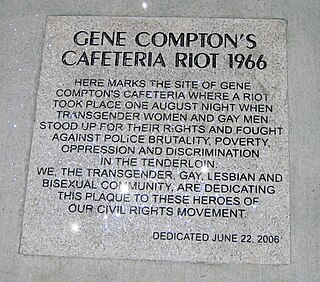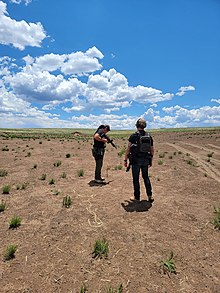
Custer County is a county located in the U.S. state of Colorado. As of the 2020 census, the population was 4,704. The county seat is Westcliffe.

The Town of Silver Cliff is the Statutory Town that is the most populous municipality in Custer County, Colorado, United States. The population was 609 at the 2020 census, up from 587 in 2010.

Westcliffe is a statutory town that is the county seat of Custer County, Colorado, United States. At the 2020 U.S. Census, the population was 435.

Big Horn is an unincorporated community and census-designated place (CDP) in Sheridan County, Wyoming, United States. The population was 457 at the 2020 census.

Pride Toronto is an annual event held in Toronto, Ontario, Canada, in June each year. A celebration of the diversity of the LGBT community in the Greater Toronto Area, it is one of the largest organized gay pride festivals in the world, featuring several stages with live performers and DJs, several licensed venues, a large Dyke March, a Trans March and the Pride Parade. The centre of the festival is the city's Church and Wellesley village, while the parade and marches are primarily routed along the nearby Yonge Street, Gerrard Street and Bloor Street. In 2014, the event served as the fourth international WorldPride, and was much larger than standard Toronto Prides.

The Wet Mountain Valley is a high elevation mountain valley mostly located in Custer County but extending southward into Huerfano County in south-central Colorado. Westcliffe and Silver Cliff are the two towns in the valley which is mostly devoted to cattle ranching.

Matt Walsh is an American right-wing political activist, author, podcaster, and columnist. He is the host of The Matt Walsh Show podcast and is a columnist for the American conservative website The Daily Wire. He has authored four books and starred in The Daily Wire online documentary film What Is a Woman?.
Over the course of its history, the LGBT community has adopted certain symbols for self-identification to demonstrate unity, pride, shared values, and allegiance to one another. These symbols communicate ideas, concepts, and identity both within their communities and to mainstream culture. The two symbols most recognized internationally are the pink triangle and the rainbow flag.

The Compton's Cafeteria riot occurred in August 1966 in the Tenderloin district of San Francisco. The riot was a response to the violent and constant police harassment of drag queens and trans people, particularly trans women. The incident was one of the first LGBT-related riots in United States history, preceding the more famous 1969 Stonewall riots in New York City. It marked the beginning of transgender activism in San Francisco.

Lesbian, gay, bisexual, and transgender (LGBT) people in Azerbaijan face significant challenges not experienced by non-LGBT residents. Same-sex sexual activity has been legal in Azerbaijan since 1 September 2000. Nonetheless, discrimination on the basis of sexual orientation and gender identity are not banned in the country and same-sex marriage is not recognized.

Fred Nelson Cummings was an American farmer and rancher who served as a Democratic U.S. Representative from Colorado for four terms from 1933 to 1941.

Lesbian, gay, bisexual, and transgender (LGBT) rights in Nepal have evolved significantly during the 21st century, though barriers to full equality still exist within the nation. In 2007, Nepal repealed the laws against gay sex and introduced several laws which explicitly protected "gender and sexual minorities". The Nepalese Constitution now recognizes LGBT rights as fundamental rights. On 28 June 2023, a single judge bench of Justice Til Prasad Shrestha issued a historic interim order directing the government to make necessary arrangements to "temporarily register" the marriages of "non-traditional couples and sexual minorities". The full bench of the Supreme Court has yet to deliver a final verdict. The first same-sex marriage of a trans woman and a cisgender gay man occurred in November 2023. Nepal will be the first least developed country and the first in South Asia to legalize same-sex marriage, and the second in Asia after Taiwan.

LGBT history in Turkey covers the development, contributions and struggles of lesbian, gay, bisexual and transgender (LGBT) people in the history of Turkey and their relation between Turkish politics from the abolition of the Caliphate to modern-day Turkey.

Delhi Queer Pride Parade is organised by members of the Delhi Queer Pride Committee every last Sunday of November since 2008. The queer pride parade is a yearly festival to honour and celebrate lesbian, gay, bisexual and transgender people, and their supporters. The parade usually runs from Barakhamba Road to Tolstoy Marg to Jantar Mantar.
The 2014 Bundy standoff was an armed confrontation between supporters of cattle rancher Cliven Bundy and law enforcement following a 21-year legal dispute in which the United States Bureau of Land Management (BLM) obtained court orders directing Bundy to pay over $1 million in withheld grazing fees for Bundy's use of federally owned land adjacent to Bundy's ranch in southeastern Nevada.
The state of North Dakota has improved in its treatment of lesbian, gay, bisexual and transgender residents in the late 1990s and into the 21st Century, when the LGBT community began to openly establish events, organizations and outlets for fellow LGBT residents and allies, and increase in political and community awareness.

S Sushma &Anr. versus Commissioner of Police&Ors.(2021) is a landmark decision of the Madras High Court that prohibited practice of "conversion therapy" by medical professionals in India. The court directed comprehensive measures to sensitize the society and various branches of the Union and State governments to remove prejudices against the queer community.
Eugenia Kennicott (1883–1934) recorded her life in Colorado in early 19th century in rare photographic plates. Her sister Anna kept a journal, which was published in 1993, that added to the understanding of life in the American West. Her niece published her aunt's photographs with passages from her mother's diary in the book Learn to Labor and to Wait. Kennicott suffered with the pain of tuberculosis of the spine throughout her life, and yet kept herself busy with a number of activities, including taking photographs of moments of her life.

Libs of TikTok is a handle for various far-right and anti-LGBT social-media accounts operated by Chaya Raichik, a former real estate agent. Raichik uses the accounts to repost content created by left-wing and LGBT people on TikTok, and on other social-media platforms, often with hostile, mocking, or derogatory commentary. The accounts promote hate speech and transphobia, and spread false claims, especially relating to medical care of transgender children. The X account, also known by the handle @LibsofTikTok, has nearly 3 million followers as of February 2024 and has become influential among American conservatives and the political right. Libs of TikTok's social-media accounts have received several temporary suspensions and a permanent suspension from TikTok.

Transphobia in the United States has changed over time. Understanding and acceptance of transgender people have both decreased and increased during the last few decades depending on the details of the issues which have been facing the public. Various governmental bodies in the United States have enacted anti-transgender legislation. Social issues in the United States also reveal a level of transphobia. Because of transphobia, transgender people in the U.S. face increased levels of violence and intimidation. Cisgender people can also be affected by transphobia.




















